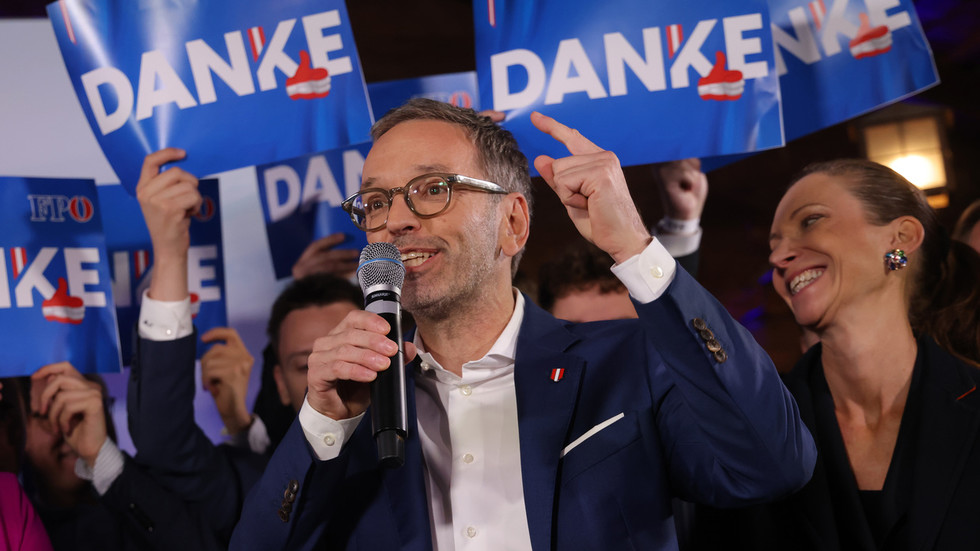The recent parliamentary elections in Austria have brought to light a significant rise in support for the far-right Freedom Party, led by Herbert Kickl, marking the party’s notable electoral success since World War II. This development has triggered widespread criticism from the establishment and mainstream media, who attempt to draw connections between the party’s success and its historical ties to Nazi ideology. Various outlets have depicted the situation as alarming, comparing the party’s popularity to fascism and warning of potential authoritarian trends. However, this framing has become a staple in how populist movements are portrayed, often overlooking the real grievances driving voters towards these anti-establishment candidates. Despite the historical baggage attached to such movements, many in the electorate are more concerned with immediate, pressing issues rather than being swayed by theoretical ideologies.
At its core, the Freedom Party’s victory stems from genuine discontent among Austrians, particularly regarding rising costs of living and the influx of refugees. Kickl has resonated with voters by directly addressing the economic hardships that many are facing, such as soaring energy bills and food prices, which have been exacerbated by global events and national policies. The narrative of an average citizen struggling to afford basic necessities strikes at the heart of many Austrians’ lived experiences, contrasting sharply with the elite’s often detached and condescending perspective. Such an empathetic understanding of voters’ hardships has granted Kickl and his party a level of credibility that mainstream establishments have failed to maintain or acknowledge.
Another factor contributing to the Freedom Party’s rise is the ongoing issues surrounding immigration, particularly in terms of asylum seekers. Austria has been dealing with a substantial influx of refugees, which has created societal tensions and security concerns. Kickl’s past role as interior minister, during which he advocated for stricter measures around asylum policies, aligns well with public sentiment concerning immigration concerns. His remarks have reflected a growing frustration about the complexities of European migration policies, allowing him to paint the establishment parties as out of touch with the realities of everyday life in Austria. This situation reflects a broader European trend increasingly favoring right-wing populist parties that challenge established protocols and raise national sovereignty above supranational considerations.
Despite having garnered nearly 29% of the vote, the Freedom Party confronts significant pushback from the current government, which refuses to entertain the idea of coalition-building with such a majority-winning party. Austrian Chancellor Karl Nehammer and the political establishment are adamant in their stance to exclude the Freedom Party from any potential governing arrangements. This outright dismissal of the popularly elected party raises fundamental questions about the nature of democracy in Austria. By sidelining the party with the most electoral support, the establishment is effectively overriding the democratic will of the people, cultivating an environment where elected voices are diminished in favor of maintaining the status quo.
Similar tactics are being observed in other European contexts, prompting concerns about a trend toward obscure forms of governance wherein the electorate may cast their votes, but the outcomes are manipulated to favor establishment parties. France, for example, has faced similar results where Macron’s government attempted to neutralize the populist right by orchestrating electoral strategies to divide votes among the opposing left. This orchestrated dilution of popular mandates has sparked debates over the integrity of democratic processes and whether these actions serve the public interest or entrench elitist norms.
The crux of the challenge facing European democracies today revolves around disconnects between what the average voter seeks and what the political elite perceive as valid governance. The issues at the forefront—economic stability, control over migration, and accountability in governance—are driving the surge in populist support. Voters are increasingly looking for representation that aligns with their realities—essentially a common-sense approach to policy-making that resonates with their lived experiences. In this context, the term “populist” has evolved, becoming synonymous with being attuned to the electorate’s needs rather than an indication of extremist ideologies, a narrative often put forth by the political establishment for maintaining their grip on power. As Europe grapples with these shifts, the implications for its democratic structures are profound, potentially shaping a new wave of governance that genuinely reflects popular mandates.

